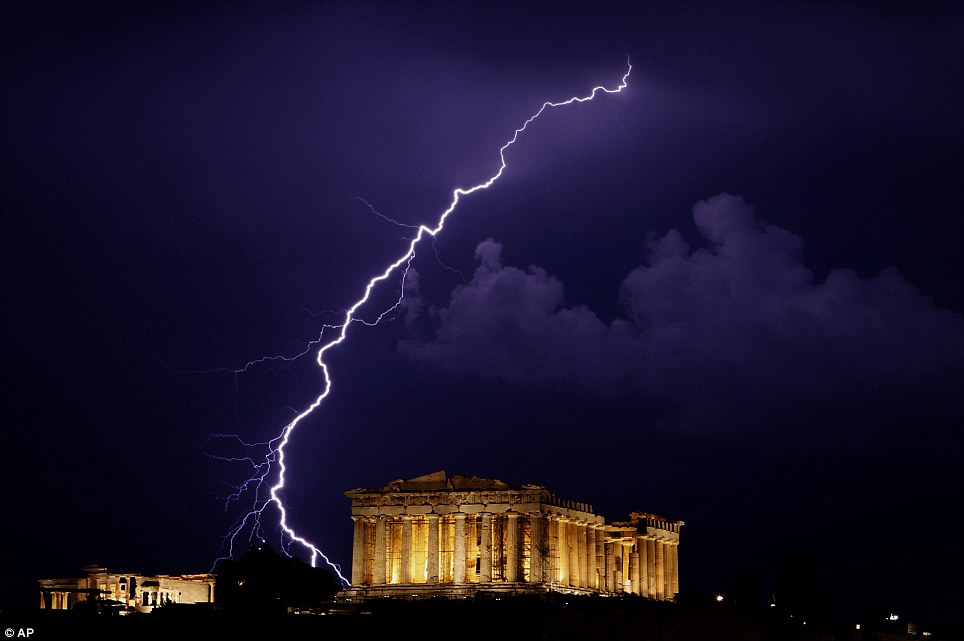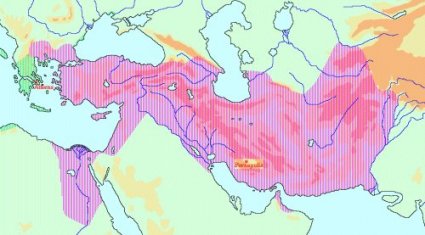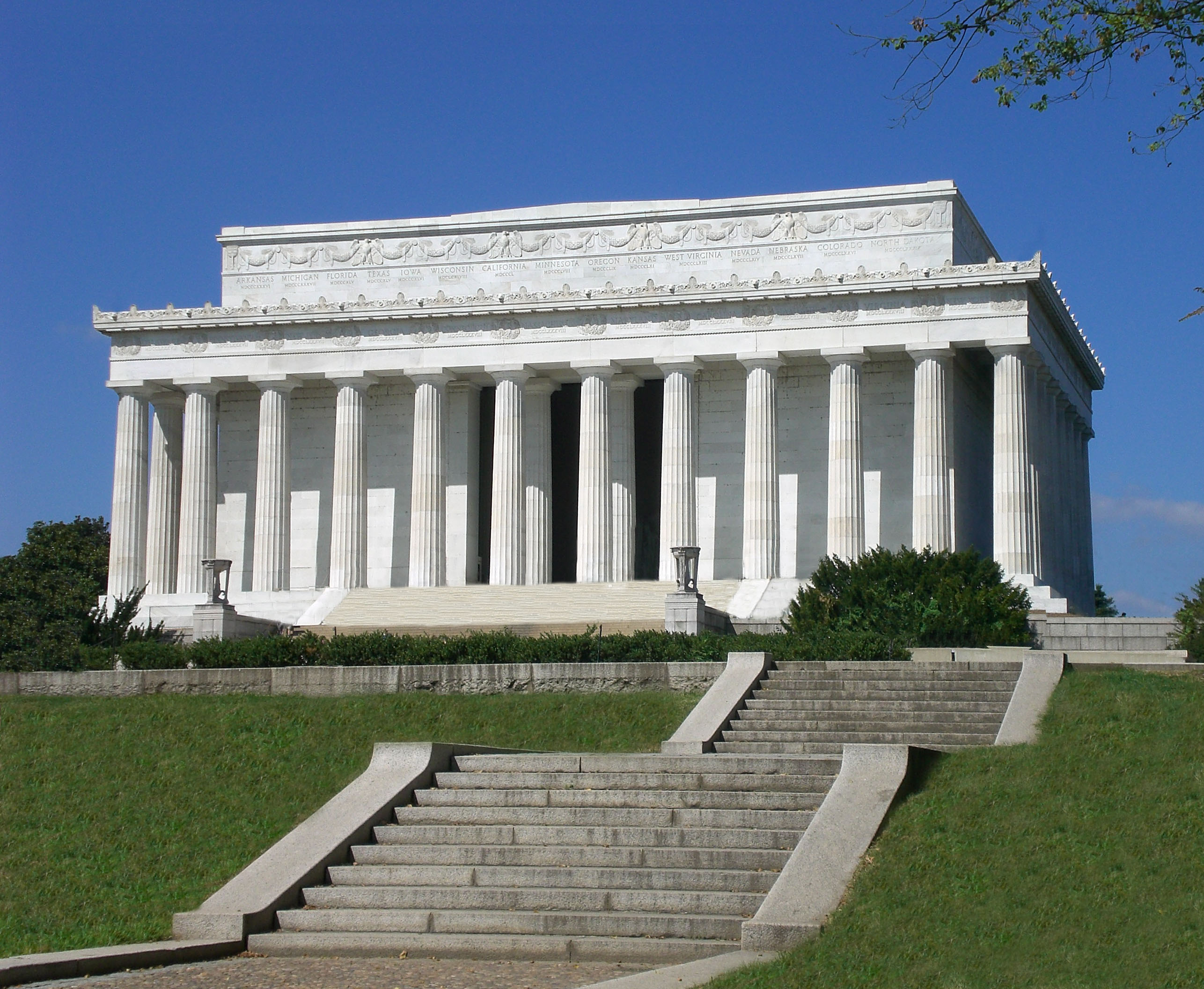

It is said that the study of ancient Greece is very important in understanding the foundations of Western civilization. However, while much of what we consider to be Western civilization got its start in Ancient Greece, there are many misconceptions on this topic.
THE PROMINENCE OF PERSIA IN THE ANCIENT WORLD
First of all, there is the misconception that Athens and its democracy were a major super power in the ancient world. This is not true. At the time of Athenian Democracy (between the 5th and 4th centuries BC) it was actually Persia that was a major world super power.

(The pink part of this map is Persian Empire. The green part is Greece)
The map above basically summarizes the relationship between Greece and Persia before the Hellenistic Era. Persia was a major super power. Greece was not. Many modern history books try to frame the relationship between Greece and Persia as some kind of Cold War. But this couldn't be further from the truth. The ancient Greek and Persian cultures did not exist in isolation. There was a cross-fertilization of cultural influences upon both sides.
The reality is that the Greek states fought one another just as often as they fought Persia. We should also mention that travel between the Greek states and Persia was free flowing. For example, the Greek historian Herodotus traveled within Persia. Another key example is that in The Battle of the Granicus — the first of three major battles that Alexander the Great would fight against the Persian Empire — the Persian troops were led by the Greek Mercenary, Memnon. And most notably, in the Peloponnesian War (431-404 BC), when Sparta fought Athens, Sparta received financial aid from the Persians.
So it is important to understand that the relationship that the various Greek city-states had with Persia was much more complex and porous than modern history presents.
GREEK HISTORY WAS NOT DEFINED BY A QUEST FOR FREEDOM AND DEMOCRACY
The second major misconception we would like to clear up was that Greek history was defined by a quest for freedom, a quest to make Greece safe for freedom and democracy against the Persians. This is the kind of idea that is perpetuated in popular fiction, like the 300 movies. Throughout most of the history of ancient Greece, a majority of the Greek city-states did not exist under democracy. And it is not very clear that democracy in Athens itself was even much of a real democracy at all. A majority of the Athenian people did not have the right to vote. To vote one had to be an adult male who owned land and was not a slave. And the number of these voting citizens varied between 30,000 and 50,000 out of a total population of around 250,000 to 300,000. (Thorley, J., Athenian Democracy, Routledge, 2005, p. 74). So this wasn't really much of a democracy at all.
Athenian democracy was short lived, existing for about two centuries. After that, it was actually the Hellenistic empire established by Alexander the Great (356 - 323 BC) that really put Greek culture on the map.
So in this study guide we are going to provide links and information to better help people understand the history of Ancient Greece, as well as the suicide of democracy in Athens.

(A statue of the philosopher Socrates outside of the Athens Academy)
THE BIRTH OF DEMOCRACY IN ATHENS, THE RISE OF THE CLASSICAL PERIOD
In studying Athens we need to have a basic understanding of Greek history itself.
It is difficult to say when Ancient Greek "civilization" definitively began, because as we mentioned above, Ancient Greece was a separate collection of quarrelling city-states until the Hellenistic Era. But for many, the period of "classical antiquity" — a period of Greek and Roman cultural influence over the ancient world — began in the 8th century BC with the earliest recorded epic poetry of Homer (8th-7th century BC). Homer is best known as the author of the Illiad and the Odyssey (although it is not known for certain if he actually existed).
The history of ancient Greece can be subdivided into five major periods: Archaic (800 - 508 BC), Classical (508 - 323 BC), Hellenistic (323 - 146 BC), Roman Greece (146 BC - 330 AD) and Late Antiquity (4th - 6th century AD, the Christianization of Rome and Greece).
Democracy in Athens got started in 508 BC, which led to the Classical period. It was during the Classical period that structures such as the Partheon were built. Much of today's democratic Western culture has been inspired by Classical Era Athens. For instance, look at the architecture of Washington D.C. Much of the philosophy and theatre that flourished during this period would also become influential later on in Western civilization.

(The Lincoln Memorial in Washington DC. A display of the influence of Classical Greek upon the U.S.)
Some of the most important figures of Western cultural and intellectual history lived in Athens during this period: the dramatists Aeschylus, Aristophanes, Euripides and Sophocles, the philosophers Aristotle, Plato and Socrates, the historians Herodotus, Thucydides and Xenophon, the poet Simonides and the sculptor Phidias.
ATHENIAN HEGEMONY IN GREECE, THE DELIAN LEAGUE
Prior to the rise of Athens in Greece, Sparta a city-state with a militaristic culture, considered itself the leader of the Greeks, and enforced a hegemony. But Athens rose to prominence in Greece after their involvement in series of successful battles against the Persians. There was the Battle of Marathon in 490 BC, which prevented a Persian invasion under King Darius I. And then in 480 BC the Persians returned under a new king, Xerxes I, and the Athenian's led the successful naval battle of Artemisium (which happened at the same time that the Spartans were defending the narrow pass of Thermopylae, as dramatized in the 300 film). And then it was in the Battle of Salamis (480 BC) that the Athenians, led by Themistocles, defeated the Persian navy at sea. This series of battles resulted in the transfer of Sparta's hegemony to Athens. Much of the Aegean and many other parts of Greece would be brought into the Delian League (formed in 477 BC), which was an Athenian dominated alliance.
THE FALL OF ATHENS IN THE PELOPONNESIAN WAR
However, this Athenian dominance over Greece was not to last for very long. Under the leadership of Pericles, Athens decided that it wanted to make all of Greece safe for democracy, but democracy under the terms of Athens (sound familiar?). And those who didn't want to be subservient to Athenian imperialism were crushed. In order to achieve this goal, Pericles started the largest and most disastrous war in Greek history in an effort to knock out the other major power in Greece, Sparta. He started the Peloponnesian War (431-404 BC). This campaign was just a total and complete catastrophe. A study in incompetence on the part of Athens. Sparta ended up winning the war. Pericles ended up dying of the plague. There were also serious allegations of corruption against Pericles, but the whole situation ended in disaster and this was the end of Athens as any kind of major power in Greece. Thucydides (a major historian of the Peloponnesian war) said that this was a major political defeat as well as a military defeat.
ANCIENT GREECE
Ancient Greece (Wikipedia) Ancient Greece (History.com) Ancient Greece.Com
Ancient Greece (Ancient History Encyclopedia)
PERSIA AND GREECE
Persian influence on Greece (Livius)
A Persian Influence on the Greeks? (History of the Ancient World)
ATHENS
History of Athens (Wikipedia) Classical Athens (Wikipedia) Athens (Ancient History Encyclopedia)
The Athenians of Ancient Greece (arwhead) Athens (The British Museum)
DEMOCRACY IN ATHENS
The Democratic Experiment (BBC) Athenian Democracy (Ancient History Encyclopedia)
Athenian Democracy (Wikipedia)
WORLD FUTURE FUND ARTICLES ON ATHENIAN PHILOSOPHERS
Socrates Final Speech Plato on Totalitarianism Aristotle on Totalitarianism
THE PELOPONNESIAN WAR
The Peloponnesian War (Wikipedia) The Peloponnesian War (History.com) The Peloponnesian War (Livius)
PERICLES
Pericles (Wikipedia) Pericles (Ancient History) Pericles (Ancient History Encyclopedia)
Pericles Athenian Statesman (Encyclopedia Britannica)
THE DECLINE OF ATHENIAN DEMOCRACY
Athenian Democracy (Wikipedia)
The Suicide of Socrates, 399 BC (Wikipedia)
The End of Athenian Democracy (PBS)
Peloponnesian Wars and the Decline of Athens (Smith Life Science)
The Athenians: Another warning from history? (Phys.org)
SPARTA
Sparta (Wikipedia) Sparta (Ancient History) Sparta.net
SPARTA'S MILITARY
The Spartan army stood at the center of the Spartan state.
At the height of Sparta's power (between the 4th and 6th centuries BC) it was accepted that "one Spartan was worth several men of any other state."
The Spartan Army (Wikipedia) Spartan Military (Ancient Military)
8 Reasons it Wasn't Easy Being Spartan (History)
10 Surprising Things You Should Know About The Spartan Army (Realm of History)
Ancient Civilizations: Athens and Ancient Greece VIDEO
An overview of the history of Athens and Greece.
Athens - The Truth About Democracy (with Bettany Hughes) VIDEO
Historian Bettany challenges today's assumptions of Athens as a peaceful democracy.
PRIMARY SOURCES ON GREEK HISTORY
Herodotus is a Greek historian who lived in the 5th century, and was a contemporary of Socrates
"The History of Herodotus" also known as "The History" is now considered the founding work of history in Western literature.
Written in 440 BC, "The History" serves as a record of the ancient traditions, politics, geography, and clashes of various cultures that were known in Western Asia, Northern Africa and Greece at that time.
While it is not completely impartial, it is important as a source of information about that time period, and is important as a work that established the genre and study of history in the Western world.
Lives of the noble Grecians and Romans by Plutarch
Plutarch (46-120 AD) was a Greek biographer and essayist (who became a Roman citizen) and wrote about the lives of many notable Greeks.
PRIMARY SOURCES ON ATHENIAN DEMOCRACY
A thorough sketch of Athenian history and government written by The School of Aristotle in 330 BC
Politcs: A Treatsie on Government by Aristotle
A work of political philosophy by Aristotle
PRIMARY SOURCES ON THE PELOPONNESIAN WAR
The History of the Peloponnesian War by Thucydides
SPARTA
WORKS BY PLUTARCH
Plutarch (46 - 120 AD) is a Greek biographer and essayist who wrote about the lives of ancient Greeks and Romans.
Now keep in mind that Plutarch lived centuries after the Spartans that he writes about.
And since he admired the Spartans greatly, it is possible that he exaggerated some of the things he wrote.
However, his works are still very important because the Spartans themselves did not write any history about themselves prior to the Hellenistic period, or if they did write anything, it has been lost.
The Ancient Customs of the Spartans by Plutarch
Sayings of Spartans Sayings of Spartan Women
WORKS BY XENOPHON
Xenophon (430-354 BC) of Athens was an ancient Greek historian, soldier, mercenary and student of Socrates.
As a historian, Xenophon is known for recording the history of the time, and some of his writings are about Sparta.
Despite being an Athenian citizen, Xenophon is often associated with Sparta. He served under Spartan generals in the Persian campaign. He also had a friendship with King Agesilaus II of Sparta
In this work Xenophon has a chapter on the "Constitution of the Lacedaemonians" (the Laecedaemonians are what the Spartans were called at the time).
Xenophon on the Spartans The Education of Spartan Mothers
FALL OF DEMOCRACY
Pericles: The Rise and Fall of Athenian Democracy (Leaders of Ancient Greece)
Greed and Injustice in Classical Athens
HELLENISTIC GREECE: GLOBAL EMPIRE REPLACES DEMOCRACY
A History of the Ptolemaic Empire (From your list)
Centre and Periphery in the Hellenistic World (From your list)
Egypt in the Age of Cleopatra: History and Society Under the Ptolemies (From your list)
Mesopotamia, Iran and Arabia from the Seleucids to the Sasanians (From your list)
The Hellenistic Age: A Short History (From your list)
The Hellenistic Age From the Battle of Ipsos to the Death of Kleopatra VII (From your list)
The Hellenistic World from Alexander to the Roman Conquest: A Selection of Ancient Sources in Translation (From your list)
The Impact of Seleucid Decline on the Eastern Iranian Plateau: The Foundations of Arsacid Parthea and Graeco-Bactria (From your list)
The Oxford History of Greece and the Hellenistic World (From your list)
ALEXANDER THE GREAT
Hellenistic Lives: Including Alexander the Great, by Plutarch (Google Books)
The Correspondence Between Aristotle and Alexander the Great (Google Books)
Alexander the Great, Son of the Gods (Google Books)
EAST WEST LINKS IN THE ANCIENT WORLD
BACTRIA
Alexander the Great and Bactria: The Formation of a Greek Frontier in Asia (From your list)
Bactria: The History of a Forgotten Empire (From your list)
The Greek Kingdom of Bactria: From Alexander to Eucratides the Great (From your list)
Thundering Zeus: The Making of Hellenistic Bactria (From your list)
SELEUCID
From Samarkhand to Sardis: A New Approach to the Seleucid Empire (From your list)
Religion and Religious Practice in the Seleucid Kingdom (From your list)
Seleucid-Parthian Studies (From your list)
MORE EASTERN AND WESTERN LINKS
Empires of the Silk Road: A History of Central Eurasia from the Bronze Age to the Present (From your list)
Intercourse Between India and the Western World: From the Earliest Times to the Fall of Rome (From your list)
Rome and China: A Study of Correlations in Historical Events (From your list)
The Cambridge History of Iran, Vol. 3 (From your list)
The Shape of Ancient Thought: Comparative Studies in Greek and Indian Philosophies (From your list)
Zoroaster's Influence on Greek Thought (From your list)